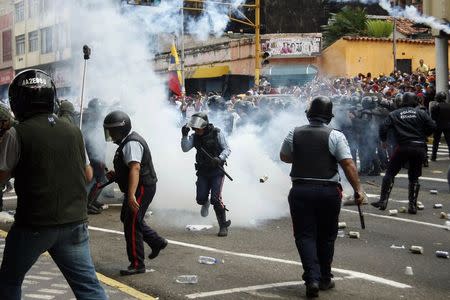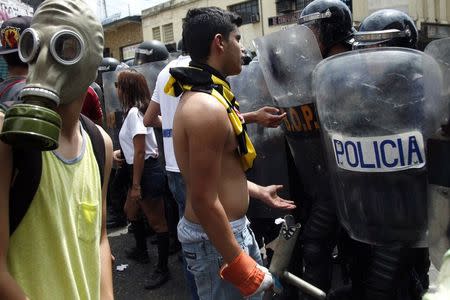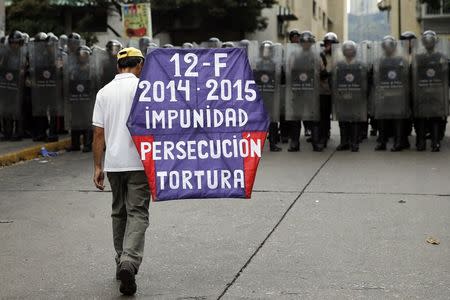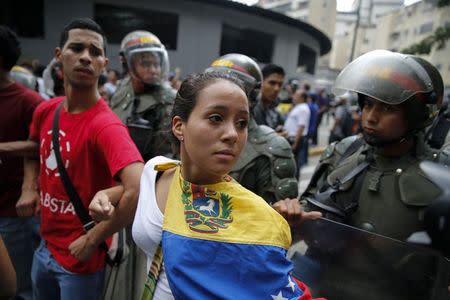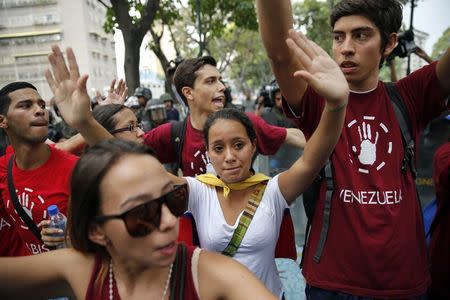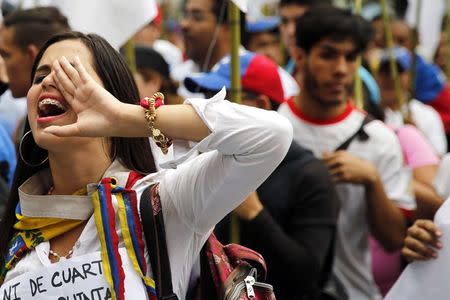Violence flares in Venezuela on anniversary of 2014 fatalities
By Andrew Cawthorne and Javier Farias CARACAS/SAN CRISTOBAL (Reuters) - Venezuelan security forces faced off with stone-wielding protesters on Thursday as supporters of President Nicolas Maduro also rallied on the anniversary of last year's fatal unrest. The flare-ups, in the volatile western city of San Cristobal and the capital Caracas, recalled four months of protests and violence in 2014 killing 43 people and underlined just how tense the South American OPEC nation remains. In San Cristobal, National Guard soldiers and police fired teargas and buckshot against demonstrators who hurled pipes and Molotov cocktails when a march was blocked. Five security officials and three demonstrators were hurt in the nearly two-hour standoff, some shops vandalized, and four students arrested in San Cristobal, witnesses and authorities said. In Caracas, masked students blocked a major avenue with burning trash and threw rocks at police who also fired buckshot in a confrontation still ongoing as dusk fell. Witnesses said at least half a dozen youths were arrested in the melee. Earlier, in the capital, security forces cordoned off several hundred students on an unauthorized march to a church where they planned a mass in honor of demonstrators who died. Instead, a priest came out and briefly prayed in the open-air. In a much larger rival rally, thousands of red-clad supporters of Maduro, the successor to late socialist leader Hugo Chavez who died of cancer in 2013, gathered in a square. Mindful of last year's events, when thousands of opposition supporters took to the streets demanding Maduro's resignation and protesting over the OPEC nation's faltering economy, some Caracas residents stayed at home to avoid trouble. Various businesses closed for the day or shut shop early. "TERRORIST PLANS" "Venezuela, today, is in a far worse situation than last year. The economy is in crisis. Crime is worse. Our aim is not to topple the regime, but to demand rights and changes to failed policies," aid Fabio Valentini, 21, a pro-opposition student from Andres Bello Catholic University. Valentini was also on the street protesting on Feb. 12 last year when the first deaths occurred in what was to be the worst unrest Venezuela had undergone for a decade. Maduro says opposition radicals sought to carry out a coup in 2014, and still harbor the same ambition. The 52-year-old former bus driver and union activist said on Thursday that a new "coup attack" had been foiled. "Where did they get the stones, sticks, pipes and bottles to attack our officials?" asked local military boss General Jose Morantes in San Cristobal. "Once again, we see terrorist plans to turn a peaceful march into violence within seconds." Student leaders there blamed infiltrators for the trouble. Venezuelans are suffering shortages, long shopping lines, high inflation, and a recession exacerbated by the plunge in crude revenues. Parliamentary elections looming for the end of 2015 are adding to national tensions. Casting himself as the heir and "son" of Chavez, Venezuela's president is nearing two years in power, but could face a recall referendum in 2016 if the Democratic Unity opposition coalition garner the roughly 4 million signatures needed. "Oil prices will rise again and we'll be ok," said Javier Castillo, 20, a student at the Bolivarian University among thousands of singing, dancing and banner-waving Maduro supporters at the rally in Caracas' Plaza Venezuela. "We on the Left are people of peace, happiness and harmony. Those on the far Right are the ones seeking violence. Let those bitter mummy's and daddy's boys come here and see the joy." Jailed protest leader Leopoldo Lopez, who spearheaded last year's protests before being arrested, sent a message from jail. "The fight continues," he said via a Twitter account run by his wife. "If you tire, you lose." Both the government and opposition supporters blame each other for the 2014 deaths. Security officials, Maduro supporters and protesters were among the victims. (Additional reporting by Jorge Silva in Caracas; editing by Brian Ellsworth and Diane Craft)


